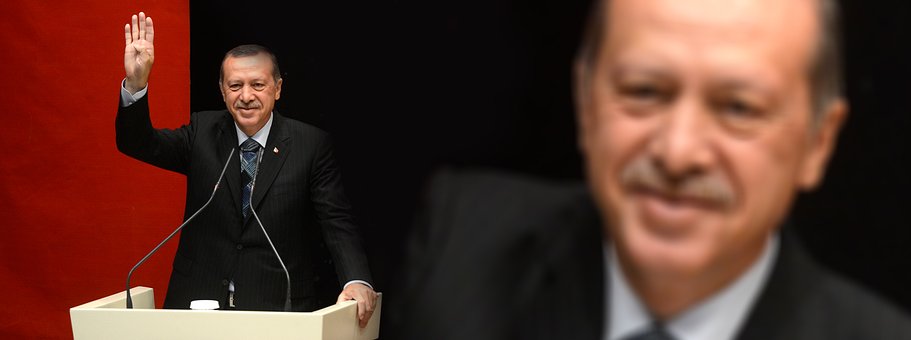
The parliament of Turkey has passed a media anti-misinformation bill proposed by the country’s authoritarian president, Recep Tayyip Erdogan. While the president and his allies in the Justice and Development (AK) Party claim this initiative is meant to protect the nation’s democracy and national security, the actual language of the bill hands Erdogan power to arbitrarily send his critics to jail for up to three years.
This is a significant blow to free speech and independent media in Turkey, both of which have been under attack since President Erdogan first gained power in the country.
Supposed anti-misinformation strategies of authoritarian leaders like Erdogan are designed to appear to confront the effects of misinformation, which is a significant contributor to democratic backsliding in democracies across the globe.
This problem allows the very people who are undermining democracy to claim they are protecting it.
On its face, Turkey’s new media law criminalizes the act of spreading false information on digital mediums like news websites and social media. The specific language of the bill allows for jail terms ranging from one to three years for individuals who share “false information on the country’s security, public order, and overall welfare in an attempt to incite panic or fear.”
Critics of the bill have pointed out that the specifications for the crime are vague, allowing the courts to interpret the new speech restrictions in ways that may be politically motivated.
This is especially problematic given President Erdogan’s campaign to reshape the judiciary in Turkey, appointing judges who agree with him and his AK party and are willing to hand down decisions in his favor. He has fired and jailed a vast number of judges and prosecutors in the country, replacing them with inexperienced loyalists willing to subvert the law to reflect Erdogan’s priorities.
Erdogan strategically appoints young judges with little to no judicial experience who are more willing to hand over power to the executive branch to further their own budding careers. This also makes them much more replaceable, which means Erdogan can alter the makeup of the judiciary with little pushback or controversy.
Turkish officials have adopted tactics like reshuffling judges in the middle of trials to ensure judges who are willing to tow the party line are the ones arbitrating high-profile cases. This new media crackdown bill allows them to wield even more control over the Turkish population at a time that could not be more convenient for Erdogan and the AK Party.
Turkey is holding presidential and parliamentary elections next year, and polls have indicated that Erdogan’s popularity has faltered since he was last elected. The new media bill gives Erdogan’s loyalist judges the ammunition they need to silence dissent and encourage media self-censorship before the next round of elections.
Freedom of speech and the press have become important issues in the country as Erdogan has systematically cracked down on protests and dissent, citing national security concerns. Erdogan and the AK Party point to the attempted military coup in 2016 as reason to restrict speech they deem dangerous to the nation’s democracy.
Erdogan has used this supposed mandate to jail and detain thousands of opposition party members, including the leader of the People’s Democratic Party, the main opposition party in Turkey’s federal government. Erdogan has accused many opponents of spreading dangerous terrorist propaganda as an excuse to remove them from the political scene in Turkey.
Erdogan has relied on executive aggrandizement to slowly expand his power and gradually change the laws of the country to turn Turkey toward authoritarianism without causing much international concern, both of which are common strategies of modern authoritarian leaders.
The result of Erdogan’s systematic campaign has been a high centralization of media under state control, with independent and opposition media being relegated to smaller outlets who are consistently targeted by Turkey’s new media misinformation legislation.
President Erdogan’s domestic authoritarian tendencies have enabled him to begin an international push to assert himself as a strongman leader and align Turkey with similar figures.
Erdogan recently announced plans with Russian President Vladimir Putin to create an international gas hub in Turkey, signaling a major collaborative effort between the two countries aimed at maintaining and expanding Russia’s influence over European energy.
This anti-misinformation media bill gives Erdogan and the Turkish judiciary the mandate to silence opposition to these plans as threatening to Turkey’s national security or general welfare.
Erdogan’s plan clearly represents a win for Putin, who aims to find new ways to move gas into Europe other than the Nord Stream link, which has come under increased scrutiny in recent years, and has been used by Putin to put pressure on Europe.
Erdogan’s alignment with Russia’s authoritarian leader over his democratic counterparts in Europe has been punctuated by his refusal to implement sanctions against Russia for their invasion of Ukraine. Like many authoritarian leaders, he is hesitant to criticize other strongman government officials abroad and demonstrates an interest in collaboration.
This should frighten anyone following the trend toward authoritarianism in Turkey. Erdogan’s coziness toward dictators and willingness to adopt their tactics is a signal of further discrimination of opposition media in the future.

0 Comments